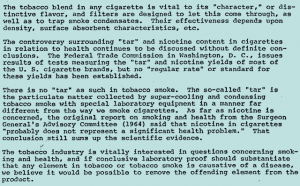Big Tobacco is not only finding it hot in the great State of Florida, but also in the great State of Connecticut as well.
There, a federal court judge, Hon. Stefan Underhill, was asked by RJ Reynolds to overturn a jury verdict for the plaintiff in the amount of $28 million (Izzarelli v. RJ Reynolds Tobacco Co; case no. 3:99-cv-2338). Judge Underhill apparently did not buy what Big Tobacco was selling any more than the jury did.
This new Connecticut case is interesting in a few ways. Big Tobacco brought on its typical defenses of cigarettes are not addictive, but if they are addictive, the plaintiff could have quit if she really tried; that there were warnings about the dangers of smoking on the cigarette packages, if they are dangerous; and that if cigarettes are dangerous, they only are because of the ingredients that are naturally found in tobacco.
The court set forth a number of things brought into evidence in the case that justified the jury verdict of $28 million.
During the 1970’s, RJ Reynolds was losing market share in the new smoker group and was desirous of catching up with their competitors in the ability to addict people to cigarettes. They had known for a very long time that a cigarette is really nothing more than a delivery system for nicotine in a form that is acceptable to the user. In other words, Big Tobacco could sell something that allowed the user to inject the drug nicotine into their system through a cigarette much easier than they could by selling it in hypodermic needles. Big Tobacco had also known for quite some time that it is “free nicotine” that really gives the smoker the “kick” of nicotine into the system and, more importantly, Big Tobacco knew they could control the levels of “free nicotine” in cigarettes, thus controlling the “kick”.
What RJ Reynolds and the other manufacturers really craved for was to lure potential smokers under the age of 18 into the cigarette addicted population. Sadly for RJ Reynolds, Kool cigarettes, manufactured by Phillip Morris, had been burning them on market share. RJ Reynolds quickly undertook to fix this problem through manipulation of nicotine in their product:
“Notably, R.J.Reynolds discovered that (when altered with fructose alone or a fructose/ammonia gas mixture) the tobacco blend formulation G7 used in its Winston and Salem products increased the amount of nicotine in the cigarette as well as the percentage of nicotine transferred to the smoker.”
And:
“With respect to the effective dose range of nicotine required to maintain addiction, R.J. Reynolds understood that, although an increase in free nicotine would enhance the addictive property of the cigarette, a decrease in the nicotine yield of the cigarette would increase the number of cigarettes required to meet the addiction demand.”
“…the jury could have reasonably found that R.J. Reynolds manipulated and altered the tobacco and the chemical additives in Salem Kings to enhance the addictive nature of the product, increase the number of cigarettes smoked by the consumer, and ultimately deliver a higher level of carcinogens to the consumer as compared to other cigarette products.”
The evidence in this case set forth that not only were Big Tobacco targeting teens in hopes of adding them to the addicted masses, for 20 years after the plaintiff (Izzarelli) began smoking and as late as the mid-1990’s, Big Tobacco persisted in its efforts to “dispel the notion that cigarettes are an addictive product and to discredit health warnings about cigarettes maintain the dangers of cigarette smoking have been well known for a century, while testifying under oath that the claimed dangers of their products do not exist at all.
In Florida, Big Tobacco regularly stands before juries and tells them the same lies that their own CEO’s have previously testified about under oath. Tobacco company lawyers stand before juries and tell them all about how the dangers of smoking cigarettes have been known to everyone for ever. They claim that nicotine, although addictive, is a naturally occurring ingredient in tobacco that is, well, not THAT addictive. They tell jurors all about “free will” and that, well shucks, they are just a bunch of poor farmers trying to eke out a living.
The truth is Big Tobacco has taken a natural product (tobacco) and spent billions of dollars trying to re-engineer it into the “best drug delivery system in the world”, while they tinker with the addictive ingredients of their product to try and increase market share. All the while Big Tobacco has been telling the public things like this excerpt of a 1976 letter from Public Relations employee TK Cahill:
The truth is that Tobacco companies want the public to believe its version of revised history. Big Tobacco needs the public and juries to believe they did not manipulate cigarettes to increase addictiveness and that anyone can quit anytime they want; they need them to believe the industry did not spend billions of dollars trying to convince the public that cigarettes were not just safe, but actually healthy for you; and they need them to believe that smokers who started smoking back in the 1940’s and 1950’s knew about the dangers of smoking.
In sum, Big Tobacco is still selling poison. They still have cigarettes on the market that addict and kill people every day. Now, though, they are also selling lies, fiction and fables to jurors and the public; well, at least to those who do not remember anything but Tobacco’s revisionist history.
Share This




